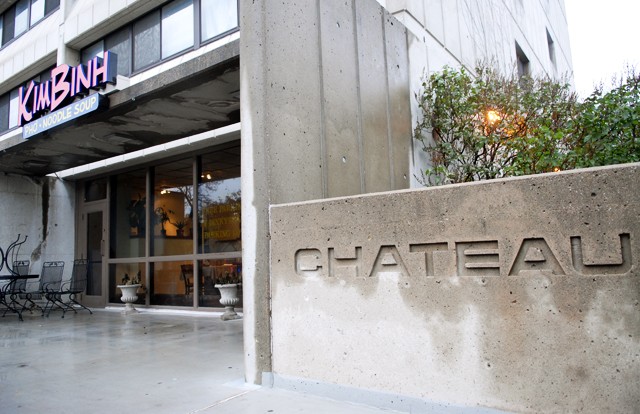Looking to carry on a family legacy in the food business, Quang Tran came across a Craigslist ad for restaurant space. Excitement prevailed over the inkling to check its rental history. âÄúI think if I were smarter at the time, I wouldâÄôve paid more attention to that,âÄù he said. KimBinh Vietnamese Restaurant has been on the ground level of the Chateau Student Housing Cooperative since May âÄî a space that has seen at least six ownership changes in the past 16 years âÄî and things arenâÄôt going as well as heâÄôd hoped. Tran attributes the poor business partially to the restaurantâÄôs location, as itâÄôs on a slow corner, itâÄôs raised from the sidewalk and it carries a negative stigma from the businesses that have come and gone. âÄúIf we were on Washington [Avenue], all the street traffic would do the marketing for you,âÄù he said. âÄúWeâÄôve found being in a slower corner and also being elevated kind of makes it more consumer un-friendly.âÄù Greg Pillsbury, owner of Burrito Loco, said he had similar issues when he moved in across the street five years ago. âÄúNo one really finds their way here,âÄù he said. âÄúWe have to go out and find them.âÄù To make up for the location, Pillsbury and his employees distribute coupons every weekday at office buildings in St. Anthony Main, St. Paul and downtown. âÄúPeople like us, we have to create our own business, our own customers,âÄù he said. Although itâÄôs a bit off the beaten path, Dinkytown as a whole is a prominent area with a lot of people, Pillsbury said. Tran says he has spent a great deal of time and money putting ads in City Pages, the U-Guide, coupon books and distributing discount flyers around the neighborhood. âÄúWe have to try to give them a reason to come here and try it,âÄù he said. ItâÄôs come as a surprise to Tran that only about 10 percent of his customers are Chateau residents. Given the buildingâÄôs large Asian population, Tran said he expected to have a stronger following from residents. The flavors in Vietnamese food are similar to that of Chinese and Korean food, he said. âÄúThereâÄôs a little familiarity to it,âÄù he said. Graduate student and Chateau resident I-Lin Ma said sheâÄôs never eaten at KimBinh because sheâÄôs not attracted to Vietnamese food âÄî she prefers spaghetti or Chinese âÄî and when she goes out to eat, sheâÄôd rather travel beyond her building. âÄúI like to try restaurants downtown or in St. Paul, instead of just under my house,âÄù she said. While none of the other Chateau residents she knows have eaten there, Bridget McAndrew said KimBinhâÄôs food is delicious. âÄúI think a lot of people just havenâÄôt had Vietnamese food,âÄù the political science senior said. Before KimBinh, the space was Asian DâÄôLite since January 2008. Owner Chansouda Chareundy said that although the restaurant didnâÄôt make enough profit to stay open longer than a year, location wasnâÄôt the reason. KimBinh is still new, she said, and most businesses donâÄôt pick up for at least two years after they open. âÄúAll businesses are like that,âÄù she said. âÄúYou canâÄôt just jump in and make plenty of money right away. YouâÄôve got to build your own clients.âÄù All of the restaurants before KimBinh served Thai food, so the switch to Vietnamese may have deterred some customers, said Chareundy, whose restaurant served a mix of Thai and Chinese food. In 1993, the space was leased out to the initial owners of Bangkok Thai Restaurant, a name which stuck despite at least three ownership swaps, said Gary Ellis, executive director of Riverton Community Housing, the company that owns the Chateau. In 2004, it became Thai Spice Restaurant, although BangkokâÄôs sign was never replaced, he said. In July 2007, Thai Rocky Spring moved in. âÄúItâÄôs difficult when thereâÄôs inconsistency and thereâÄôs a number of switches that make it difficult for whatever clientele base you have,âÄù Ellis said. âÄúThey keep coming and youâÄôre closed or thereâÄôs a new owner âÄî so itâÄôs been a rocky period.âÄù Ellis said he isnâÄôt sure exactly why each business left. While he would ask the owners how things were going, he never knew their profit numbers. He blamed two of the spaceâÄôs failed business ventures on health problems. The owner of Thai Rocky Spring had an eye condition and the one before him, a knee condition, he said. In 1989, the Viet Restaurant signed a lease to the space, marking the last time Chateau management would have to market it. From then on, each owner had to find their own replacements, as each left before their lease was up. There were so many Asian restaurants because each owner likely searched within their own network to find the next one, Ellis said. âÄúIf youâÄôre in the Asian restaurant business, youâÄôve probably got a lot of friends in that community,âÄù he said, âÄúso it kind of gets self-perpetuating.âÄù When the Chateau opened in 1972, the ground floor space held a bank that stuck around for 10 years, followed by a SchlotzskyâÄôs Deli for several more, Ellis said. KimBinh is TranâÄôs first business venture, and if things donâÄôt work out, heâÄôs at least got a degree to fall back on, he said. âÄúAfter putting a lot of heart and effort and sweat into this place, even if I could run a different restaurant successfully, I probably wouldnâÄôt,âÄù he said, adding heâÄôd likely return to the corporate world. âÄúSomething I can have a family and a normal life with. ItâÄôs tough. You really are married to the restaurant.âÄù
The curse of the Chateau
The restaurant space has seen several failed Asian ventures.

The restaurant space that currently houses KimBinh Vietnamese Restaurant on the ground level of the Chateau has seen at least six ownership changes in the past 16 years.
by Tara Bannow
Published October 21, 2009
0

